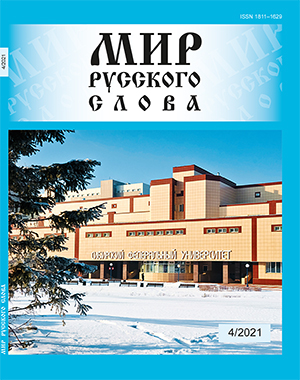The Nomination of Jesus Christ in Ivan Bunin’s Poetic Heritage
DOI:
https://doi.org/10.24412/1811-1629-2021-4-47-54Abstract
The article attempts to analyze the linguistic means of Jesus Christ’s nominations in Ivan Bunin’s lyrics, to determine the role of the onyms in expressing poet’s intention. The author analyzes more than 30 onomastic units found in Bunin’s poetic texts from 1886 to 1953. The research is new, since Christian sacred names used by the poet to name the God-Man are explored for the first time. When nominating Jesus Christ, Bunin relies on existing ideas about the Savior in Christology (for example, the Lamb, the Lord, the Bridegroom, the Son of Man, Alpha and Omega, Gladsome Radiance, etc.), on background knowledge about significant events of His earthly life (for example, Crucified, Infant, Child, etc.), on moral characteristics attributed to Him (for example, Blessed, Most Pure, Humble, Lamentable, etc.). The sources of the theonyms are the texts of the New Testament, hagiography, and the Orthodox chants. The sacred names extracted from Bunin’s lyrical heritage are characterized from the point of view of their structure. The author distinguishes the simple onyms, represented by formations of different nature, and compound onyms, represented by three models (“the noun + the adjective”, “the participle + the noun”, “the noun + the noun”). The name of Jesus Christ in Bunin’s poetry actualizes three motives: the motive of the divine child, the motive of suffering and crucifixion, the motive of resurrection.
Keywords:
Ivan Bunin, poetry, poetic onomastics, proper noun, nomination, theonym, Jesus Christ
Downloads
References
Словари и справочники
Литература
References
Downloads
Published
How to Cite
Issue
Section
License
Articles of "The World of Russian Word" are open access distributed under the terms of the License Agreement with Saint Petersburg State University, which permits to the authors unrestricted distribution and self-archiving free of charge.




